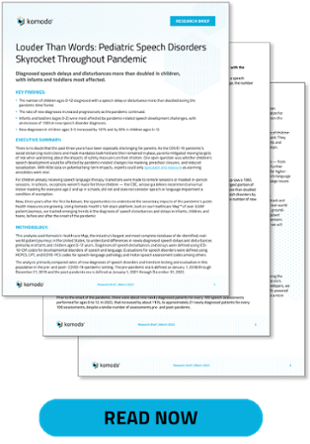Louder Than Words: Pediatric Speech Disorders Skyrocket Throughout Pandemic

Diagnosed speech delays and disturbances have more than doubled in children, with infants and toddlers most affected.
In the first year of life, a baby’s brain doubles in size. By age 3, the brain reaches about 80% of its adult volume. For children who passed through key developmental milestones after the onset of the COVID-19 pandemic, there is no doubt that certain social and environmental changes will have influenced their development.
 The extent to which the pandemic's mitigative safety measures affected speech development specifically has been an open question — a burden of curiosity that parents and providers have had to carry for the past three years, while managing other risks.
The extent to which the pandemic's mitigative safety measures affected speech development specifically has been an open question — a burden of curiosity that parents and providers have had to carry for the past three years, while managing other risks.
Today, we are just beginning to understand the secondary impacts of the pandemic’s public health measures. To track the emerging trends in pediatric speech diagnoses, Komodo Health™ analysts looked at claims for speech disturbances and delays in infants, children, and teens before and throughout the pandemic.
Here are some highlights of what we found:
Speech disorder diagnoses in children ages 0 to 12 more than doubled throughout the pandemic. About 1.5 million children received a new diagnosis in 2022 alone, up from an average of 570,000 in 2018/2019. Infants and toddlers were most impacted, with a 136% increase in new diagnoses among children ages 0 to 2. Children ages 3 to 5 made up the largest portion of patients with new speech disorder diagnoses both before and after the onset of the pandemic, but the rate likewise doubled in this group.
The trends elucidated in this analysis speak to the higher demand for care from specialized speech/language providers and the need for increased public and provider awareness. Moving forward, it will be important to capture patients that have yet to be diagnosed, as delays in treatment have consequences of their own. These findings also emphasize the importance of tracking health trends as they emerge whenever possible. With insights from Komodo’s analytical platform built atop up-to-date real-world data, decision-makers will better be able to act in real time to mitigate unintended consequences of new public health measures and further Komodo’s mission to reduce the burden of disease.
Read about the impacts of pandemic-related screening lags on cervical cancer, breast cancer, and colorectal cancer.
To see more articles like this, follow Komodo Health on Twitter, LinkedIn, or YouTube, and visit Insights on our website.








